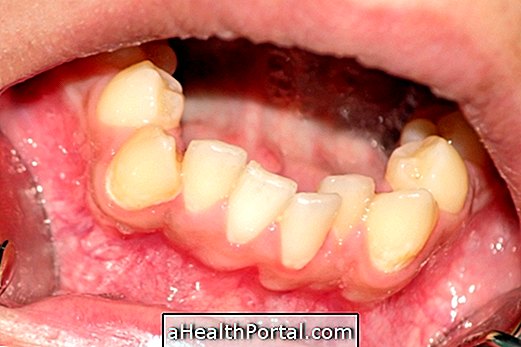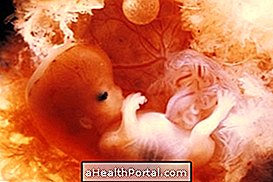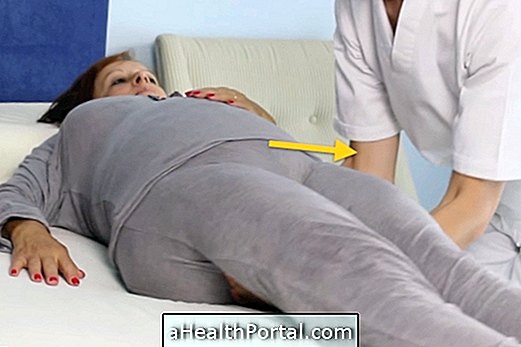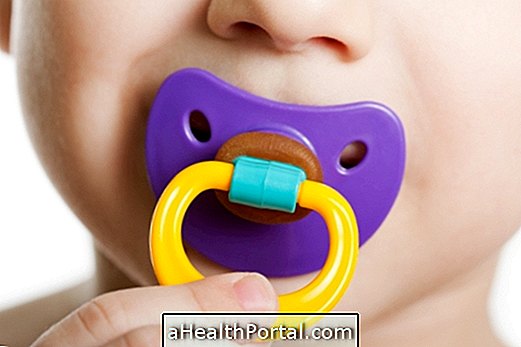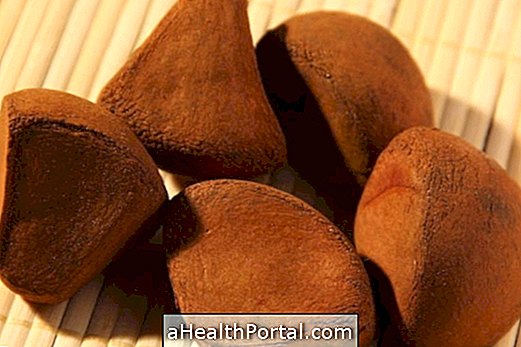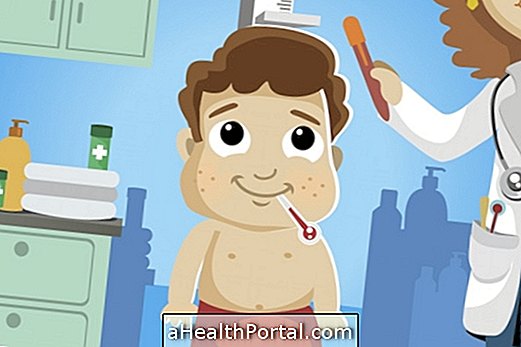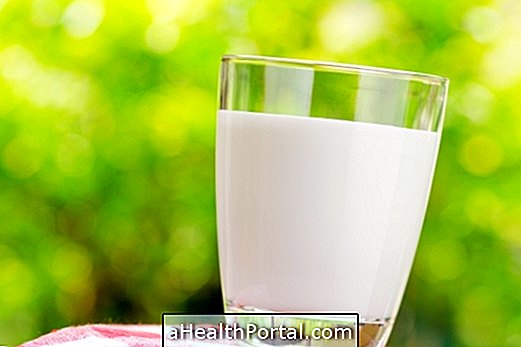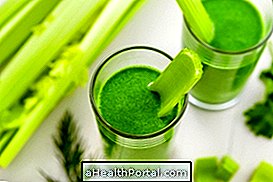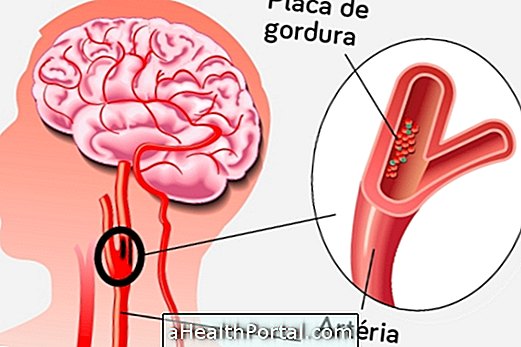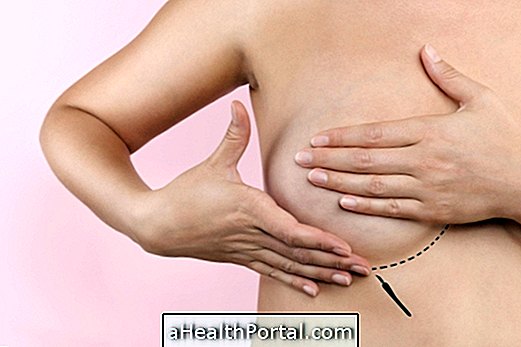Caries, also popularly known as rotten teeth, is an infection of the teeth caused by bacteria naturally present in the mouth and which accumulate forming hard plaques that are difficult to remove at home. In this plaque, the bacteria gradually perforate the enamel of the teeth and cause pain and discomfort when they reach the deepest parts of the teeth.
It is important that the person sees the dentist as soon as they identify signs and symptoms that may be indicative of cavities, such as pain in the tooth, spots on the surface of the teeth and greater sensitivity in one of the teeth. Thus, it is possible for the dentist to identify the presence of caries and initiate the most appropriate treatment, which is usually done by cleaning the mouth and performing a restoration, for example.

Caries symptoms
The main symptom of caries is toothache, however other signs and symptoms that may arise and be indicative of caries are:
- Pain that gets worse when eating or drinking something sweet, cold or hot;
- Presence of holes in one or more teeth;
- Brown or white spots on the tooth surface;
- Sensitivity when touching a tooth;
- Swollen and sore gum.
In the initial phase, caries often do not present any symptoms and, therefore, when the first symptoms appear, it is very important to go immediately to the dentist to confirm the diagnosis and start the appropriate treatment, avoiding complications such as a more serious infection or loss of a tooth, for example.
Thus, during the consultation, the dentist will be able to check if there is a small hole in the teeth and, if observed, can insert an instrument with a fine point in this hole in order to assess its depth and if there is pain. In addition, when the dentist suspects that caries is present between two teeth, he or she may request an X-ray before starting treatment.
Main causes
The main cause of caries is the lack of adequate oral hygiene, as in these cases the excess of bacteria present in the mouth and the rest of food are not properly removed, which favors the development of plaques and cavities. In addition, the excessive consumption of sugary foods, such as cakes, sweets or cookies, are factors that facilitate the development of bacteria on the teeth.
The main bacterium related to caries isStreptococcus mutans, which is present in tooth enamel and develops when there are large amounts of sugar in the mouth. Thus, to capture as much sugar as possible, these bacteria unite in groups, giving rise to plaque. In addition, they produce acid that corrodes the tooth enamel and destroys the minerals present, which can favor the breaking of that tooth.
Despite being caused by a bacterium, caries is not transmitted from person to person through kissing or sharing objects, because it is directly related to the eating and hygiene habits of each person.
Treatment for dental caries
The only way to treat tooth decay is to consult with the dentist, and there is no home treatment capable of eliminating it. Sometimes, just 1 session is enough to eliminate caries, with a restoration of the tooth, in which the caries and all the infected tissue is removed, followed by the application of resin.
When caries is identified in many teeth, the treatment may be more prolonged, and it may be necessary to resort to root canal treatment, also known as filling, or even removing the tooth, which then needs to be replaced with a prosthesis.
In addition, the treatment for caries involves cleaning, which consists of removing the bacterial plaques present in the mouth. See more details about the treatment of cavities.

How to prevent
The best strategy to prevent caries is to brush your teeth at least 2 times a day to eliminate food debris from your teeth and prevent the formation of plaque, in addition to flossing regularly, as it helps to remove food debris. that may be between the teeth and that could not be removed with just brushing.
Taking a sip of water after eating is also a good strategy, especially when you can't brush your teeth. However, other important precautions include:
- Decrease the consumption of sugar and foods that stick to your teeth;
- Prefer a fluoride toothpaste whenever brushing your teeth;
- Eat 1 apple after a meal to clean your teeth;
- Eat 1 slice of yellow cheese such as cheddar, for example to normalize the pH of the mouth, protecting the teeth from bacteria that cause cavities;
- Always have sugar-free gum around because chewing stimulates salivation and it protects your teeth because it does not allow bacteria to produce the acid that corrodes your teeth.
- Floss and mouthwash, especially before bed, and if you use braces, always after eating. Here's how to brush your teeth properly to avoid cavities.
In addition, it is advisable to go to the dentist every 6 months, to make a more thorough cleaning of the teeth, completely removing the plaque. In some cases, the dentist may also apply a thin layer of fluoride to your teeth, especially children's teeth, to strengthen your teeth. Take our online test below to assess your knowledge of oral health:
- 1
- 2
- 3
- 4
- 5
- 6
- 7
- 8
Oral health: do you know how to take care of your teeth?
Start the test


It is important to consult the dentist:
- Every 2 years.
- Every 6 months.
- Every 3 months.
- When you are in pain or some other symptom.

Floss should be used every day because:
- Prevents the appearance of cavities between teeth.
- Prevents the development of bad breath.
- Prevents inflammation of the gums.
- All of the above.

How long do I need to brush my teeth to ensure proper cleaning?
- 30 seconds.
- 5 minutes.
- Minimum of 2 minutes.
- Minimum of 1 minute.

Bad breath can be caused by:
- Presence of cavities.
- Bleeding gums.
- Gastrointestinal problems like heartburn or reflux.
- All of the above.

How often is it advisable to change the toothbrush?
- Once a year.
- Every 6 months.
- Every 3 months.
- Only when the bristles are damaged or dirty.

What can cause problems with teeth and gums?
- The accumulation of plaque.
- Have a high sugar diet.
- Have poor oral hygiene.
- All of the above.

Inflammation of the gums is usually caused by:
- Excessive saliva production.
- Accumulation of plaque.
- Tartar build-up on teeth.
- Options B and C are correct.

In addition to the teeth, another very important part that you should never forget to brush is:
- Tongue.
- Cheeks.
- Palate.
- Lip.
Foods that prevent cavities
Some foods help to clean the teeth and balance the pH of the mouth, decreasing the risk of cavities, such as fibrous foods, such as carrots, cucumbers and celery, and foods rich in proteins, such as tuna, eggs and meats, for example.
Check out other foods that help prevent cavities by watching the following video:

Was this information helpful?
Yes No
Your opinion is important! Write here how we can improve our text:
Any questions? Click here to be answered.
Email in which you want to receive a reply:
Check the confirmation email we sent you.
Your name:
Reason for visit:
--- Choose your reason --- DiseaseLive betterHelp another personGain knowledge
Are you a health professional?
NoMedicalPharmaceuticalsNurseNutritionistBiomedicalPhysiotherapistBeauticianOther
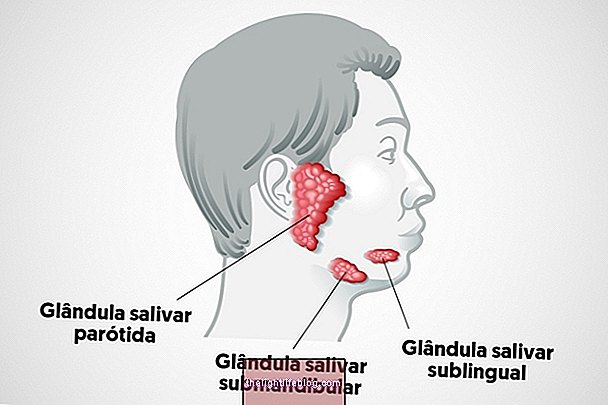

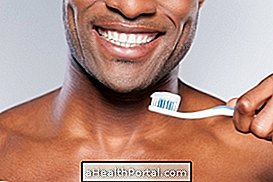

-causas-e-como-tratar.jpg)
